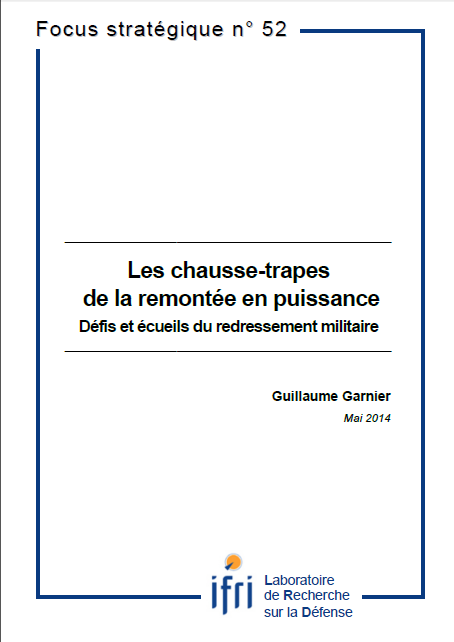Les chausse-trapes de la remontée en puissance : Défis et écueils du redressement militaire

A process of military resurgence shows a government’s will to strengthen its defense apparatus, either to face new strategic challenges or, more frequently, to reverse decline of its capabilities.
The ongoing budgetary crisis, which keeps harming many countries, causes an accelerated weakening of European armed forces. Thus, the question of military resurgence is urgent, at least for those countries that deem necessary maintaining a credible defense tool. Military resurgence is everything but simple. The sharper the drop in capabilities, the more difficult, costly and long the resurgence will be. A swift consolidation may be enough to patch up an apparatus that suffers from minor shortcomings. Should these multiply up to the point of endangering the coherence of the system, a much more substantial build-up would be needed. Ultimately, only a massive, enduring and global effort of reconstruction could efficiently deal with the actual collapse of armed forces. Consequently, this paper highlights the critical importance of threshold effects when considering the development and sustainment of such an effort, effects which must be taken into account before any crippling decision is taken. More specifically, loss of either military or industrial skills has to be carefully thought on and controlled, otherwise the resurgence will fail, however ample the funding may be.
This content is available in French: Les chausse-trapes de la remontée en puissance : Défis et écueils du redressement militaire
Related centers and programs
Discover our other research centers and programsFind out more
Discover all our analysesMapping the MilTech War: Eight Lessons from Ukraine’s Battlefield
This report maps out the evolution of key technologies that have emerged or developed in the last 4 years of the war in Ukraine. Its goal is to derive the lessons the North Atlantic Treaty Organization (NATO) could learn to strengthen its defensive capabilities and prepare for modern war, which is large-scale and conventional in nature.
"Iron Swords" A Military Analysis of Israel's War in Gaza
On October 7, 2023, Hamas' attack, dubbed “Al-Aqsa Flood,” caused a major shock and led Israel to launch the longest war in its history. Operation “Iron Swords” was notable for its unprecedented intensity, both in terms of the massive ground forces deployed and the firepower used.
Saudi Arabia’s Nuclear Temptations. Lessons Learned from Regional Instability
Saudi Arabia’s integration in the international arena and regional stability, notably through reducing its dependence on fossil energies, are crucial elements for the success of the Kingdom’s Vision 2030, the Crown Prince’s top priority. However, Mohammed bin Salman’s declarations in 2018 and 2021, indicating that “if Iran develops a nuclear bomb, we will follow suit as soon as possible”, combined with the recent strikes on key Iranian nuclear facilities, do not bode well for the future of the Kingdom, the region and the non-proliferation regime at large.
The Future of Air Superiority. Command of the Air in High Intensity Warfare
Air superiority, understood as control of the air, is a cornerstone of the Western art of warfare. It is a decisive condition, albeit not sufficient by itself, to achieve military victory, as it enables the concentration of air power toward the achievement of wider strategic objectives and protects other components from unbearable attrition levels. It is best achieved through the offensive use of air power in a joint effort to neutralize the enemy’s air power.











